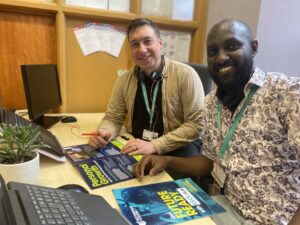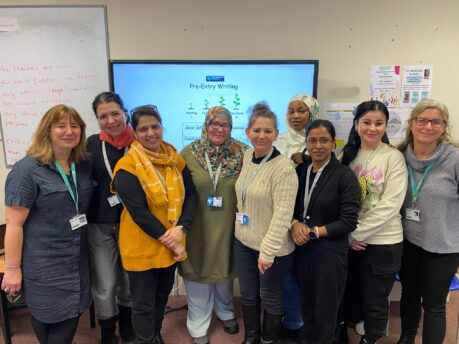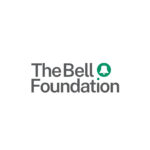In Conversation with Beacon Award Finalist, Nottingham College: “Our ESOL learners want to be in work”
In this blog, we speak to Linda McDonald and Lizzie Toschi from Nottingham College to reflect on their nomination for the Beacon Excellence in ESOL award, and how their staff support students not only to improve their English, but to gain confidence and experience for their futures.

In 2024, Nottingham College was named a finalist for AoC The Bell Foundation Excellence in ESOL Award. This recognises the college's innovative teaching and tailored support services, and their part in enabling ESOL students to achieve their personal, academic, and professional goals.
Linda McDonald, Head of ESOL Faculty, and Lizzie Toschi, ESOL Curriculum Manager get together to reflect on the nomination and how their staff go above and beyond to support students not only to improve their English, but to gain confidence and experience for their futures.
Linda: Our main priority as a learning provider of ESOL is two-fold: we help learners to recognise that having an ESOL qualification gives them currency to apply for further vocational courses or for jobs because these serve as proof of their competence. But our work is also much wider than that – it's about supporting learners into education who may never have been in education before or may be very nervous about it.
Lizzie: Yes, our ESOL learners no longer want to just learn English. They've become more ambitious, and they want to get qualifications – they want to be in work. Progression is really important.
Linda: So, Lizzie, how has our ESOL programme been adapted to meet the needs of our students?
Lizzie: The landscape of our ESOL learners has changed over the past few years – we're now seeing much lower literacy levels since COVID and Brexit. As a result, we now offer a more comprehensive reading, writing, listening, and speaking programme at Pre-Entry and Entry One levels. Our offering now also reflects much more the needs of our students wanting to learn English to enter the workplace.
Linda: I agree that we do try and balance the teaching of language skills with helping learners to understand life in the UK, by teaching grammar and vocabulary through topics that are going to be useful for the students beyond the classroom, such as accessing healthcare, voting, and sustainability.
Linda: We were thrilled to be shortlisted for the Beacon Award for Excellence in ESOL. It brings a feel-good factor both in and outside the college, for everyone who has been involved in these learners’ journeys. Lizzie, why do you think our ESOL programme has been recognised?
Lizzie: The first thing I’d mention is our Level 1 Volunteering to Support English course, where our own ESOL students learn how to volunteer and then complete a placement in one of our Pre-Entry ESOL classes, alongside their own course. This not only supports their English language learning but also enables them to develop their vocational skills to go out into the education sector, such as working in a school or nursery. It’s been a real game changer for our Pre-Entry classes, which then benefit from the help of these bilingual or even trilingual volunteer students who support both the teacher and learners. They also support our reading club where Pre-Entry ESOL learners can come and practice their literacy skills.
Linda: Yes, the volunteering course is a good experience for students in that we treat each as if they're a paid applicant, but in a supportive environment. They have to fill in all the relevant paperwork, complete the mandatory teacher training, and we support them with a DBS application. It’s also been encouraging to see our former ESOL volunteers ending up in employment following their placement. Some former students are even employed here at the college.

It’s also been encouraging to see our former ESOL volunteers ending up in employment following their placement. Some former students are even employed here at the college.
Lizzie: From your point of view Linda, what have been some of the main outcomes and success stories in our students? For me, it was seeing one of our ESOL learners being shortlisted for the Association of College’s Student of the Year award.
Linda: Yes, there are lots of examples of our learners who have faced adversity, have come to the UK, and been given a chance to start again, and all of us are really passionate about the fact we’ve been able to support them on that journey. We had one student who got back in touch to let us know that he is now running his own accountancy firm. Hearing about what our former students are up to is one of the things that everyone's most proud of, isn't it?
Lizzie: Yes, and I think our students’ progress is particularly showcased in our ESOL plus courses, which enable them to attend vocational classes tailored to their needs, in areas such as motor vehicle, science, fashion, beauty, and hairdressing for example. The vocational teachers have been really impressed by how motivated and hard working the ESOL students are – while their language might be a barrier initially, most of them have a lot of relevant expertise. There’s often an assumption that not everyone in ESOL has a job, while in reality, many are juggling both employment and study in order to get back into the career they already have expertise in.
The ESOL+ courses benefit learners’ language and fluency, their confidence, and it just gives them that bit more ambition to keep pushing through and breaking down barriers to get into the workplace.
Linda: I think another reason why our ESOL provision has worked so well is thanks to our city-wide partnerships. We work very closely with and host an organisation called Begin, which acts as a gateway for anyone in Nottingham who is interested in ESOL. Before any learner arrives at college, BEGIN assesses their needs - ranging from levels of English and eligibility for funding to the times they are available. They then register them on a database and offer community ESOL classes with their nearest local provider until there is an available space at college. It's a fantastic system. Their data helps all providers and us to plan for the coming year, so we can be really responsive to the needs of those who are wanting to learn English.

The ESOL+ courses benefit learners’ language and fluency, their confidence, and it just gives them that bit more ambition to keep pushing through and breaking down barriers to get into the workplace.
Linda: So, what's next on the agenda for our ESOL programme?
Lizzie: Essentially, we're trying to meet our learners’ needs by looking at what they need qualification-wise in order to do the course that they are most interested in. This means developing courses with vocational areas that are in-demand. We're also launching a new ESOL class with Functional Skills, as well as our existing GCSE courses, as it is often an entry requirement for other vocational courses which are taught in English.
Linda: In addition, one of the new internal challenges we face is having just become part of a devolved authority, and so we must navigate the waters of what we're allowed to do in terms of funding for qualifications and funding for tailored learning. For us, it's about meshing those two things together – what we're funded for and what the students need.
